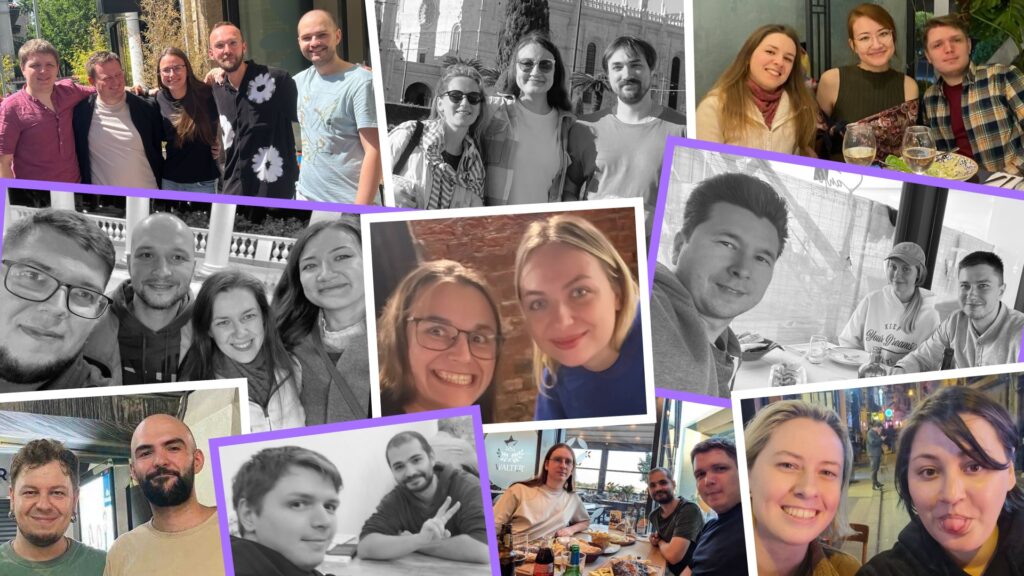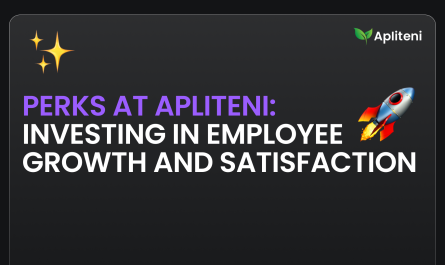Apliteni has been a distributed, remote team from the get-go, and many of our specialists have been with us from the beginning. When hiring, it’s usually not to fill a recently opened position but to find the right person for a new role. One of the reasons for that is that our People Ops team knows their stuff when it comes to team building.
Creating an engaged remote team presents unique challenges. Here are the best practices for fostering a friendly and productive atmosphere in remote, distributed teams, which in turn leads to higher job satisfaction rates, company appreciation, and higher levels of loyalty.
Have a Friendly Atmosphere
Fostering a friendly atmosphere in the workplace is essential for enhancing team morale. A positive work environment can significantly influence teams’ well-being and efficiency. Here are three strategies to create such an environment:
1. Encourage Informal Interactions
Regular informal elements in meetings, like we have on Friday catch-ups, significantly enhances team morale. These sessions should focus on something other than work. Allow team members to share personal stories and discuss various topics of interest. This helps to build personal connections and camaraderie.
We also have a special channel for informal conversations, where we say “hey” when we log in to Slack–the same as if you entered a physical office. There we congratulate people on their birthdays, share memes, good music for work, and virtually anything that can be interesting or fun. This is a place for the “cooler conversations.” There, we also share our monthly highlights if we want to. Travel pics, and even funny drawings of kids–that sometimes turn into a t-shirt print that can be ordered by any team member as Apliteni merch.
Establishing separate communication channels for different interests facilitates continuous engagement. For example, having dedicated channels for AI discussions, books, and education encourages the team to share knowledge and resources. This helps us to connect over shared interests, enhancing team cohesion.
One more thing that we do as a part of Apliteni culture is meet up with our colleagues in real life for informal gatherings. Let’s say you’re traveling through a city where someone from the company lives. When that happens, we usually make it a point to meet up and actually see our colleagues. This helps create closer bonds and connections.

These casual interactions help break down barriers and make team members feel more connected, regardless of their physical location.
2. Organize Thematic Seminars
Hosting seminars on topics such as health, goal setting, and how to rest correctly adds value beyond work skills. For example, we organized sessions before and after the New Year for reflection, planning, and goal setting to help team members align their personal and professional objectives.
These seminars can cover topics like time management, wellness, and professional development, contributing to the support of the well-rounded lives of our team members. These can be led by internal or external experts to provide fresh perspectives.
3. Invest in Merch
Providing contractors with free merchandise enhances team spirit and shows appreciation. Branded items such as t-shirts, shoppers, and baseball caps create a sense of belonging and pride among remote workers. These tangible reminders of team connection are valuable in a virtual environment. Distributing branded merchandise reinforces company culture and promotes team loyalty.
Keep up the Productivity
4. Recognize Special Areas of Expertise
We have cross-functional teams within the company. However, professionals with similar skill sets, like designers, frontenders, backenders, and others, are formed into Guilds. These groups provide a sense of community and support within the area of expertise. Some Guilds meet once a week to share new information, tools, ideas, etc. That helps continuous development for all members and assists in team building.
5. Value Trust and Autonomy
There must be trust among the team, and it should be a part of the corporate culture. Micromanaging leads to disengagement and decreased morale. Providing flexibility in schedules, as long as the deadlines are met, fosters responsibility and boosts productivity. Trusting employees and only stepping in when things aren’t on track has proven to be very effective. Empowering the team with autonomy leads to increased job satisfaction and productivity.
6. Conduct Regular Feedback Sessions
Feedback sessions are crucial for understanding needs and improving work processes. Individual feedback sessions facilitate open communication.
Feedback helps Team Leads and People Ops to understand peoples’ feelings and provides insights into improving work processes. The important thing is to be respectful and listen. These are the cornerstones of a positive work environment. Encouraging colleagues to speak their minds and share their opinions without interruption ensures that everyone feels heard and valued.
7. Celebrate Achievements
Recognizing and celebrating team achievements maintains motivation. Acknowledging hard work through shoutouts during meetings or small rewards fosters a positive work environment. Contractors don’t want to feel like another cog in the machine. Celebrating wins helps them feel valued.
8. Use the Right Tools with Clear Guides
Effective communication and collaboration in remote teams rely on the right tools. Platforms like Slack and Google Meet facilitate seamless communication, while tools like ClickUp, Figma, GitHub, and Google Suite support project management and collaboration.
Choosing tools that integrate well streamlines workflows and enhances productivity. Selecting tools that cater to specific team needs and integrate with existing workflows is essential.
Ensuring everyone works together by following cohesive, well-thought-out guides and processes contributes to everyone being on the same page and minimizes the margin for misunderstandings, enhancing transparency and efficiency.
Building a remote team requires intentional efforts to create a friendly atmosphere and identify the most effective and best-fitting processes. Implementing these best practices significantly enhances team morale and productivity, thus leading to lower turnover rates and overall company success.




